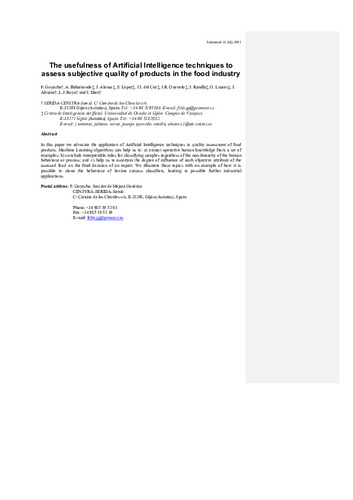The usefulness of artificial intelligence techniques to assess subjective quality of products in the food industry
Fecha de publicación:
Editorial:
Elsevier
Versión del editor:
Citación:
Descripción física:
Resumen:
In this paper we advocate the application of Artificial Intelligence techniques to quality assessment of food products. Machine Learning algorithms can help us to: (a) extract operative human knowledge from a set of examples; (b) conclude interpretable rules for classifying samples regardless of the non-linearity of the human behaviour or process; and (c) help us to ascertain the degree of influence of each objective attribute of the assessed food on the final decision of an expert. We illustrate these topics with an example of how it is possible to clone the behaviour of bovine carcass classifiers, leading to possible further industrial applications
In this paper we advocate the application of Artificial Intelligence techniques to quality assessment of food products. Machine Learning algorithms can help us to: (a) extract operative human knowledge from a set of examples; (b) conclude interpretable rules for classifying samples regardless of the non-linearity of the human behaviour or process; and (c) help us to ascertain the degree of influence of each objective attribute of the assessed food on the final decision of an expert. We illustrate these topics with an example of how it is possible to clone the behaviour of bovine carcass classifiers, leading to possible further industrial applications
ISSN:
Patrocinado por:
This paper was partially funded by a grant from CICYT-FEDER, No. 1FD97–1633 and by DGES PB98–1556. The authors would like to thank Marı́a Fernández, Jesús Fernández Tejón and Fernando Ureña from Empresa Asturiana de Servicios Agrarios (EASA) for their invaluable help and comments, and the authors of Cubist and M5 for allowing us to use their software
Colecciones
- Artículos [37543]
- Informática [873]
- Investigaciones y Documentos OpenAIRE [8377]
Ficheros en el ítem





